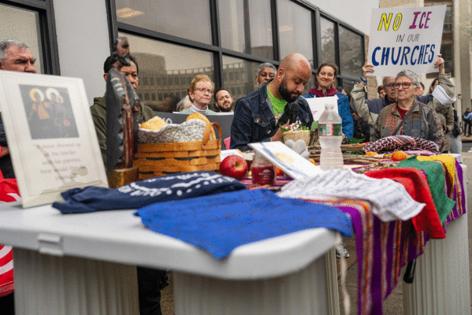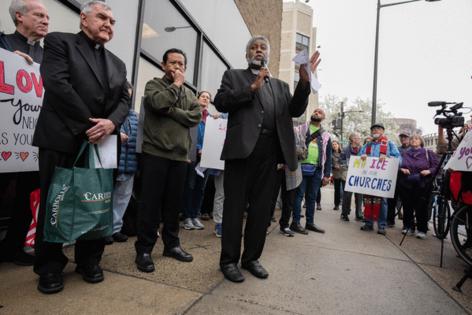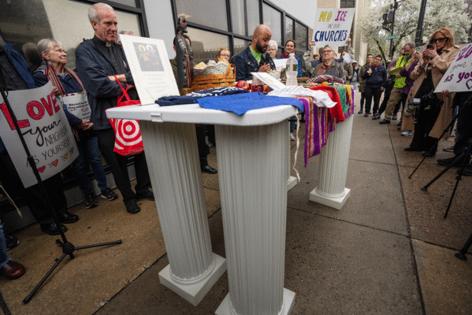Philly clergy build an altar outside of ICE headquarters, demanding return of church protection from immigration arrests
Published in News & Features
PHILADELPHIA — Clergy from across Philadelphia erected an altar in front of ICE headquarters on Thursday, decorating it with fruit, flowers and crosses in a prayerful protest against the Trump administration’s decision to let agents make immigration arrests in churches.
The demonstration spilled off the sidewalk and onto Eighth Street in Center City, closing the route to traffic, held the day before a federal court in Washington, D.C., considers a lawsuit that seeks to restore the ICE policy that barred enforcement at houses of worship.
“We defend the sacred, not ICE, not Trump,” New Sanctuary Movement of Philadelphia Co-Director Peter Pedemonti told the crowd of about 90, who gathered from more than 30 congregations and included Catholics, Buddhists, Mennonites, Unitarians, Methodists, and Jewish people.
ICE officials declined to comment.
Outside the nondescript corner ICE office, pastors built an altar out of a plastic folding table and four short Doric columns. They stepped forward one by one to place offerings on its surface — apples and tangerines, Tibetan prayer flags, roses, a small carving of Christ with arms outstretched.
“ICE is trying to take away every safe space,” Rev. Jonny Rashid, the son of Egyptian immigrants and pastor of the West Philadelphia Mennonite Fellowship, told the crowd. “People who used to rely on the U.S. for protection are now living in fear.”
ICE had long deemed houses of worship and other “sensitive locations” off-limits for arrests, except in extraordinary circumstances.
But a January Trump directive eliminated those restraints in what the administration said was a move to keep American citizens safe.
“Criminals will no longer be able to hide in America’s schools and churches to avoid arrest,” the Department of Homeland Security, which governs ICE, said in a statement at the time. “The Trump administration will not tie the hands of our brave law enforcement, and instead trusts them to use common sense.”
Immigration and Customs Enforcement policy had kept agents from acting not only at churches but at hospitals, schools, colleges, funerals and demonstrations.
The policy enabled the most desperate undocumented immigrants to take sanctuary in churches, blocking their deportations by putting themselves beyond the reach of ICE. More than a dozen migrants took sanctuary inside Philadelphia churches during Trump’s first administration, the most of any city in the country.
Some spent years inside. Most were women and children. They couldn’t go out, but ICE agents couldn’t go in.
Since Trump’s election to a second term, activists who helped shelter immigrants in churches in Germantown, University City, and North Philadelphia pledged fresh resistance, pointing out that a knock on the door does not automatically require an answer.
New Sanctuary Movement has been alerting church leaders that the change in policy does not mean ICE can enter at will. Pedemonti earlier advised clergy to ask to see legal judicial warrants if agents appeared.
No one is currently living in church sanctuary in Philadelphia, according to NSM.
But pastors said on Thursday that the threat of enforcement was chilling, that congregants worried they might be arrested as they went to or from services, and that even a door opening mid-sermon could jangle nerves.
“There’s a lot of fear, but we’re here,” Rev. Christopher Neilson, founder and pastor of The Living Church, told the demonstrators. “We’re here to affirm and reclaim the sanctity of our space, to say that our space is sacred.”
He prayed, he said, not just for immigrants at risk of arrest, but also for the officers of ICE, adding, “We’re telling you we do love you.”
In January several Quaker groups, including one in Philadelphia, sued the Department of Homeland Security over Trump’s revocation of the sensitive-locations policy. A federal judge paused the policy change for Quaker, Sikh, and Baptist congregations affiliated with the lawsuit.
That suit, filed in Maryland, claimed that “allowing armed government agents wearing ICE-emblazoned jackets to park outside a religious service and monitor who enters or to interrupt the service and drag a congregant out during the middle of worship is anathema to Quaker religious exercise.”
The complaint asserted that “the very threat of that enforcement” deters congregants — especially members of immigrant communities — from attending services, which is detrimental to the groups’ religious exercise and violates First Amendment rights of religious liberty.
In February the Institute for Constitutional Advocacy and Protection at Georgetown Law filed a second, similar lawsuit on behalf of two dozen Christian and Jewish denominations. They claimed that Trump’s directive “greenlights enforcement actions that could interrupt religious services in furtherance of the administration’s mass deportation plans.”
The plaintiffs asserted that the government was interfering with their religious activities and their ability to fulfill their religious mandate to welcome and serve immigrants.
“It is up to us as clergy to respect the sacred spaces,” said Msgr. Hugh Joseph Shields, a retired priest of the Archdiocese of Philadelphia who attended the Thursday protest, “and not let manmade rules override the places where God has deemed us to be.”
About 47,000 undocumented people live in Philadelphia, their lack of legal status putting them at risk during what Trump promises will be the largest deportation campaign in American history. Those in the city are among 153,000 undocumented statewide, with an additional 440,000 in New Jersey.
Many Americans want them, among 13.7 million in the country illegally, to be deported.
Nearly a third say all undocumented immigrants should be deported, and another half want some people kicked out under certain circumstances, according to new findings by the Pew Research Center in Washington, D.C.
The majority of those polled believe the federal government should be allowed to arrest those here without permission at their homes, jobs, and at protests or rallies, but not at schools, hospitals, or houses of worship.
“We’re here to demand that the government open itself to the truth,” Rabbi Linda Holtzman of Tikkun Olam Chavurah told demonstrators on Thursday. “We are here in front of ICE because we know that ice can melt."
_____
©2025 The Philadelphia Inquirer. Visit inquirer.com. Distributed by Tribune Content Agency, LLC.












Comments